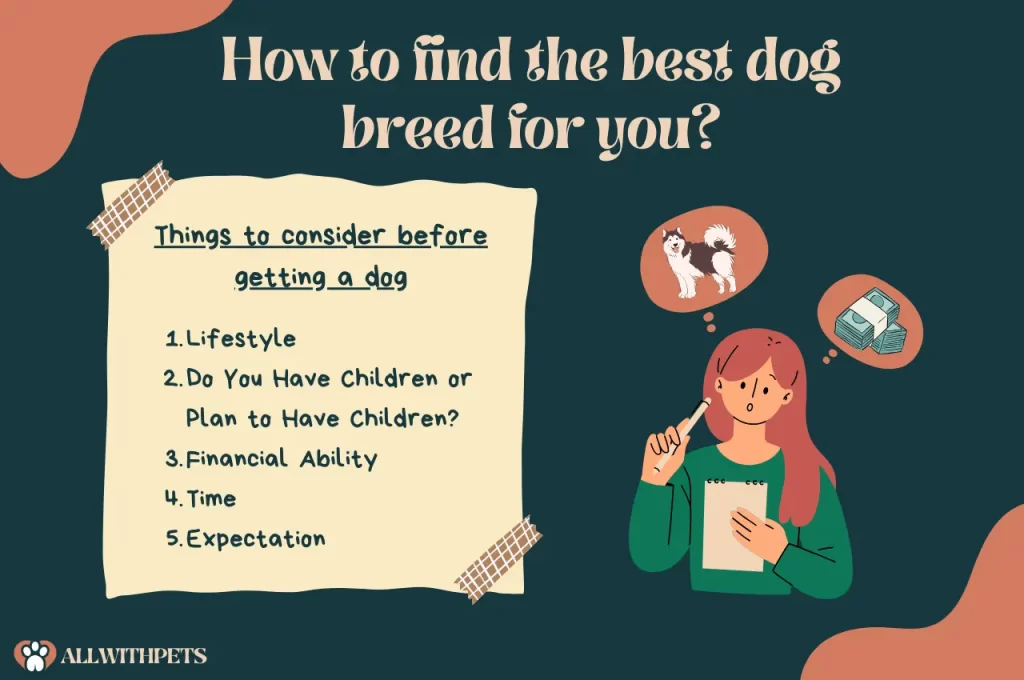
What dog breed is right for me? You may also have the same question. Just like raising a child, getting a dog is challenging, and picking the wrong breed can be incredibly frustrating. Understanding these critical points before you get a dog can help you find the best dog breed for you. This article will talk about the essential things to consider before getting a dog so you can find the best dog breed for you. Sit back, relax, and let’s dive in!
Read More: 11 Best tips for first time dog Owners
Are You Suited for Dog Ownership?
Here are some key points you need to consider if you’re thinking about getting the best dog breed for you:
01
of 5
Lifestyle
When you bring a dog home, it becomes part of your family and will live with you for years. To choose the best dog breed for you, considering your lifestyle is crucial. Are you very active or more laid-back? Do you love outdoor activities or prefer staying indoors? Some breeds are naturally calm and only need regular walks to be content for example, French bulldogs.
In contrast, others are energetic and require lots of exercise to burn off their energy like Golden Retriever. Even small to medium-sized dogs can have endless energy. If you end up with a high-energy dog without realizing it, you might find them chewing on things and causing trouble out of boredom. Understanding your lifestyle is critical to selecting the best dog breed for you.
02
of 5
Do You Have Children or Plan to Have Children?
Dogs, like people, have different personalities, and each breed has its unique characteristics. Some breeds are naturally gentle and get along well with children, even helping to look after them. However, some breeds are more aggressive or excitable for instance, Rottweiler, which could lead to accidental injuries from jumping or playing too rough.
For families with children, small to medium-sized dogs might be a better fit. However, with proper training and interaction, larger breeds like Golden Retrievers can also coexist wonderfully with kids. If you have children, it’s crucial to choose a breed known for sound temperament, ease of training, and compatibility with family life.
Read More: 8 Most Dangerous Dog Breeds
03
of 5
Financial Ability
Did you know that the average lifetime cost of owning a dog is about $28,800? Do you genuinely have the financial means to care for a dog? This is a very practical question. While you can raise a dog frugally, certain expenses are unavoidable. Before getting a dog, ensure you have a stable income that can cover both your and your dog’s needs. Veterinary visits, regular check-ups, food, treats, toys, supplies, grooming, and boarding all add up.
Large dogs might eat you out of the house and at home, while small dogs might require frequent grooming, which costs a pretty penny. Additionally, purebred dogs often have hereditary health issues requiring regular vet visits and supplements. Assessing your financial ability is essential in choosing the best dog breed for you.
04
of 5
Time
Have you considered how much time you spend away from home each day? And how much time can you actually spend with a dog? Dogs are social animals that thrive on interaction with their owners and family. With this interaction, having a dog gains more of its purpose. Before getting a dog, think about how much time you can dedicate to it daily.
If you have a demanding job and are away from home for over 12 hours a day, a calm, older dog might manage better on its own. However, suppose you decide to get a puppy. In that case, they require a lot of time for companionship and training, especially during the first few months when they are adjusting to your household. Lack of attention and exercise can lead to behavioral issues. Understanding your available time and evaluating the dog’s personality will help you choose the best dog breed for you and your lifestyle.
05
of 5
Expectation
What do you expect from having a dog? Think about what you want to achieve with a dog—this is the core question of dog ownership. Some people want a dog to lead a healthier lifestyle, others seek companionship to alleviate loneliness and gain warmth and security, and some believe that having a dog will provide a wonderful experience for their children. These are all great expectations because they focus on the positive aspects of living with a dog.
However, if your expectations are narrow, such as wanting a dog solely for protection against intruders or choosing a breed impulsively because it looks cute, you might face challenges. Dogs selected for specific traits, like being guard dogs, often end up being treated as tools rather than family members. Likewise, impulsively getting a cute breed like a poodle without considering the care they require can lead to abandonment. Clarifying your expectations for dog ownership is crucial for finding the best dog breed for you and making a thoughtful and responsible choice.
Choosing the best dog breed for You
Once you have clarified and met all the prerequisites mentioned above, the next step is to understand your needs and start researching potential dog breeds. This will help you determine if they match your personality, budget, lifestyle, and expectations.
Think about whether you prefer a large, medium, or small dog. Ask yourself a series of questions: If you like large dogs, do you have enough space for them to move around? Do you prefer long-haired or short-haired dogs? Can you tolerate dog hair everywhere? Do you or your family members have allergies? These are all crucial considerations in selecting the best dog for you.
Dog Breeds
After considering the questions above, you should have a clearer idea of what breeds suit you. For example, if you love exercise and the outdoors, a high-energy breed like a Border Collie could be a great choice. On the other hand, if you want an active and intelligent dog that doesn’t require a lot of space and doesn’t shed much, a Miniature Poodle might be perfect. If you want a gentle companion to grow up with your children, a Golden Retriever could be the ideal breed.
Suppose you need to become more familiar with different breeds. In that case, you can use the American Kennel Club (AKC) dog breed generator to help you find the best dog breed for your lifestyle. You can also compare the breeds you’re considering in terms of traits like trainability, shedding, lifespan, and more. This will help you make an informed decision on the best dog breed for you.
Read More: 9 Best dogs for first time owners (2024)
Gender
Once you have your heart set on the best dog breed for you, it’s time to consider the gender. Male dogs are generally bigger and don’t have periods to deal with. Still, they do like to mark their territory by peeing everywhere and tend to get into fights more often. If they come across a female in heat, they can lose their minds and do some pretty extreme things.
On the other hand, female dogs are usually more affectionate, clingy, and easier to manage. They don’t have strong territorial instincts and are less likely to fight. However, you will need to take care of them during their heat cycles, which happen twice a year and last for two to three weeks each time.
Once you’ve chosen a target breed, dive deep into understanding every aspect of it. Learn as much as you can about the breeds you’re interested in. Then, visit reputable and legal breeders, tell them what breed you’re looking for, and describe the traits and personality you want in a dog. They will give you professional advice and recommend the best dog breed for you.
Conclusion

Whether you want to adopt or buy a purebred, it’s crucial to understand your ability to care for a dog and your lifestyle. This way, you can choose the best dog breed for you, ensuring a happy life together with your furry friend. Do you feel that you and your dog are a good match? If given the chance to choose again, would you still pick the same dog?
In short, if you want to have a dog, make sure to choose the best dog breed for you. A dog’s life is only a few decades long. Are you willing to dedicate part of your journey to their entire life? Please make a thoughtful decision and don’t waste your dog’s short life. Happy pet parenting!



